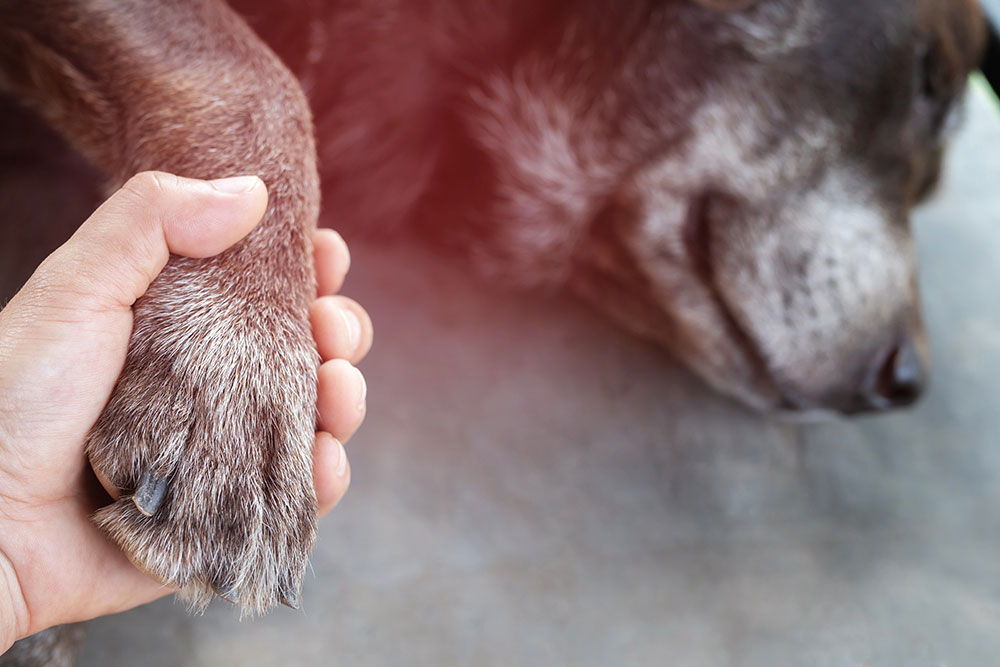Senior Dog Health: Recognizing and Managing Age-Related Illnesses
Getting older doesn’t mean giving up the joy of walks, playtime, or tail wags. However, senior dogs are more vulnerable to diseases such as arthritis, diabetes, and kidney issues. Recognizing these conditions early allows for treatments that relieve discomfort and extend quality of life- helping your dog enjoy every stage of aging with vitality.
At Creature Comforts Veterinary Service, our AAHA-accredited hospital provides comprehensive care for aging pets, blending advanced diagnostics with genuine compassion. From wellness screenings to emergency support available 24/7, we ensure your senior dog receives consistent, individualized care at every stage of life.
What Happens When Dogs Age?
Aging affects every organ system in your dog’s body. Metabolism slows, joints stiffen, organ function declines, and even cognitive processing may shift. These changes are natural- but not all are harmless.
A tired dog might simply need more naps, or they could be struggling with heart disease or hypothyroidism. Reduced appetite might stem from dental pain or kidney issues, while hesitating to play or jump could indicate arthritis. Understanding what’s “normal” versus what’s not is essential for early diagnosis.
Supporting your senior pet through veterinary care recommendations starts with observation and communication. Our veterinarians recommend twice-yearly wellness exams and preventive screenings- including blood work, urinalysis, and imaging- to catch potential diseases before symptoms become severe.
Early detection can transform age-related illness from life-limiting to manageable, allowing your dog to remain comfortable and engaged well into their senior years.
Common Age-Related Conditions in Senior Dogs
Arthritis and Mobility Challenges
Osteoarthritis is one of the most common chronic conditions in older dogs. Over time, cartilage in the joints breaks down, causing inflammation, stiffness, and pain. You may notice difficulty standing, hesitating to jump, or stiffness after resting.
Managing arthritis often involves a multimodal approach. Anti-inflammatory medications ease pain, weight management relieves pressure on joints, and regular, gentle activity maintains mobility. Librela, a monthly injectable pain medication for arthritis, can make a world of difference. Supplements such as glucosamine and omega-3 fatty acids support cartilage repair and reduce inflammation. Physical therapy, acupuncture, and laser therapy can also improve comfort.
At Creature Comforts, our diagnostic services include X-rays and advanced imaging to assess joint health and create individualized treatment plans.
Heart Disease
Cardiac conditions, such as valve degeneration and cardiomyopathy, are increasingly common with age. Signs include coughing- especially at night- fatigue, or shortness of breath after mild exercise. Some dogs faint after excitement or show swelling in the abdomen or limbs.
Heart disease diagnosis begins with a stethoscope exam and may involve X-rays or echocardiograms to visualize the heart’s function. Medications can improve blood flow, reduce fluid buildup, and help the heart pump more efficiently.
Monitoring your dog’s resting respiratory rate at home (normal is under 30 breaths per minute) provides an early indicator of change. If it increases consistently, call your veterinarian right away. Our 24-hour emergency team is always available for cardiac crises requiring immediate stabilization.
Kidney and Liver Disease
As dogs age, the kidneys and liver gradually lose efficiency. These organs perform critical roles in filtering toxins, metabolizing nutrients, and balancing electrolytes and hormones. When they begin to falter, the effects ripple through the entire body- causing nausea, weight loss, dehydration, and overall weakness. Senior dogs may also drink or urinate more frequently, or develop dull coats and muscle loss due to the body’s struggle to process waste and nutrients effectively.
Chronic kidney disease (CKD) develops gradually and often goes unnoticed until a significant portion of kidney function is lost. While the condition can’t be cured, it can be managed successfully with proper care. Veterinary treatment typically includes a prescription renal diet that reduces protein and phosphorus levels, maintaining hydration through increased water intake or subcutaneous fluids, and medications to control blood pressure and nausea.
The liver, another essential organ for detoxification and digestion, can also decline with age. Supportive therapies for liver disease often include supplements such as SAMe or milk thistle to support cell regeneration, as well as anti-inflammatory medications to protect remaining healthy tissue.
With early intervention, many dogs live comfortably for years, maintaining good energy and appetite through consistent management and dietary support.
Hormonal and Metabolic Disorders
As metabolism slows with age, older dogs become more prone to hormonal imbalances that affect everything from energy levels to weight and coat quality. Two of the most common endocrine conditions seen in senior pets are diabetes and hypothyroidism.
Diabetes mellitus occurs when the pancreas no longer produces enough insulin- or when the body becomes resistant to it- causing glucose to accumulate in the bloodstream. Common signs include excessive thirst, frequent urination, weight loss despite normal or increased appetite, and occasionally, cataract formation leading to cloudy eyes.
Hypothyroidism is another common age-related condition, especially in medium and large breeds. It results from an underactive thyroid gland that fails to produce enough thyroid hormone, slowing the dog’s metabolism. Symptoms may include lethargy, cold intolerance, unexplained weight gain, hair thinning or loss (especially along the flanks and tail), and dull or scaly skin.
Identifying these disorders before complications arise allows for straightforward treatment and can dramatically improve a senior dog’s comfort and longevity.
Cognitive Dysfunction (Canine Dementia)
Dogs can experience cognitive decline similar to Alzheimer’s in humans. Cognitive dysfunction syndrome causes disorientation, restlessness, disrupted sleep, and loss of learned behaviors.
You might notice your dog pacing at night, staring at walls, or forgetting familiar routines. Management includes antioxidant-rich diets, medications that enhance brain function, and enrichment activities to keep their mind engaged. Consistency is key- maintain regular feeding, walking, and bedtime schedules to reduce confusion and anxiety.
Cancer in Senior Dogs
Cancer becomes more common with age, presenting as new lumps, unexplained weight loss, or changes in appetite and behavior. Types of cancer in pets range from benign growths to aggressive malignancies.
Early detection offers the best chance for successful treatment. Our in-house and referral diagnostics- including imaging, biopsies, and lab testing- help identify tumors quickly and guide treatment options such as surgery, chemotherapy, or palliative care focused on comfort.

Dental Disease and Its Hidden Risks
Dental health plays a major role in your dog’s overall wellbeing. Plaque and bacteria from infected gums can enter the bloodstream, damaging the heart, liver, and kidneys.
Common signs of dental disease include bad breath, drooling, pawing at the mouth, and difficulty chewing. Professional dental cleanings under anesthesia remove tartar and allow for safe tooth extractions when needed. Daily brushing and dental chews help maintain oral health between visits.
Alternative Therapies for Senior Comfort and Mobility
Integrative medicine can play a transformative role in helping older dogs stay active and comfortable. At Creature Comforts Veterinary Service, we offer alternative medicine options that complement traditional Western treatments to manage chronic pain, inflammation, and mobility issues holistically.
Acupuncture stimulates specific points in the body to relieve pain, improve circulation, and support overall wellness. For senior dogs, acupuncture can help control arthritis pain, improve mobility, and even enhance appetite or energy levels. It’s gentle, safe, and often deeply relaxing.
Massage therapy benefits aging dogs by reducing muscle tension, improving flexibility, and enhancing blood flow to stiff joints.
Laser therapy uses focused light energy to reduce pain and inflammation while stimulating tissue repair. This treatment is ideal for post-surgery recovery, soft-tissue injuries, or chronic joint disease, helping dogs heal faster and stay more mobile.
Traditional Chinese Veterinary Medicine (TCVM) integrates acupuncture, herbal medicine, and nutrition to restore balance and promote long-term health. Our veterinarians are trained in TCVM techniques and may recommend them for conditions like arthritis, endocrine disorders, and anxiety- helping your senior pet find relief through both ancient and modern approaches.
Used alongside medications or other treatments, these treatments can extend mobility and enhance your dog’s quality of life.
Helping Your Dog Age with Grace and Comfort
Aging doesn’t mean losing quality of life. With early intervention, alternative therapies, and a strong veterinary partnership, senior dogs can continue to thrive. Many chronic conditions can be managed successfully, allowing pets to stay playful, alert, and affectionate for years to come.
At Creature Comforts Veterinary Service, we’re more than a hospital- we’re your partner in care. Our team’s dedication to compassionate, individualized medicine ensures your dog receives the attention they deserve every single time.
If your dog is entering their senior years or showing signs of slowing down, schedule a senior wellness exam.
Contact us today to learn how we can help your senior dog age with dignity, comfort, and love.







Leave A Comment